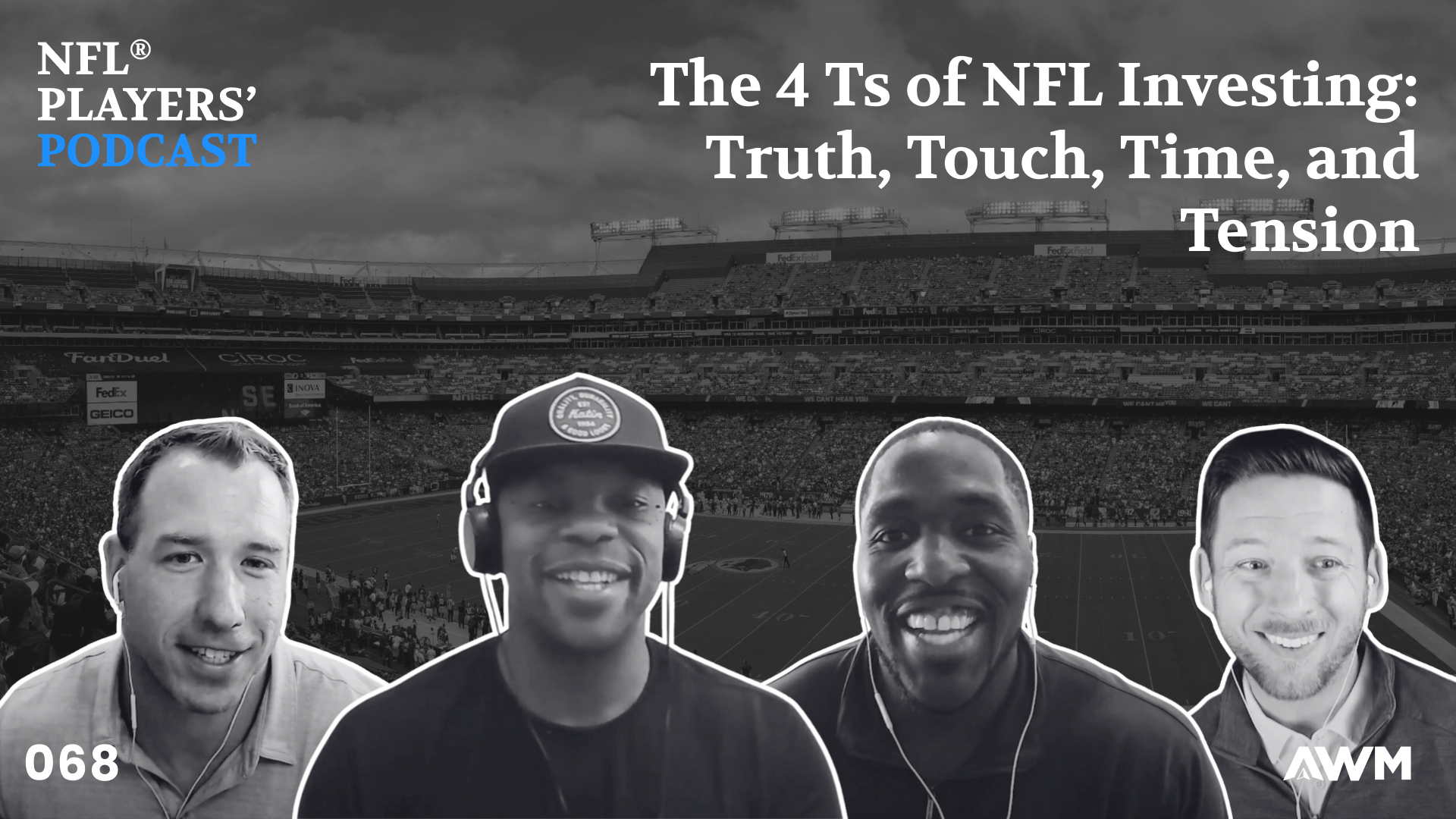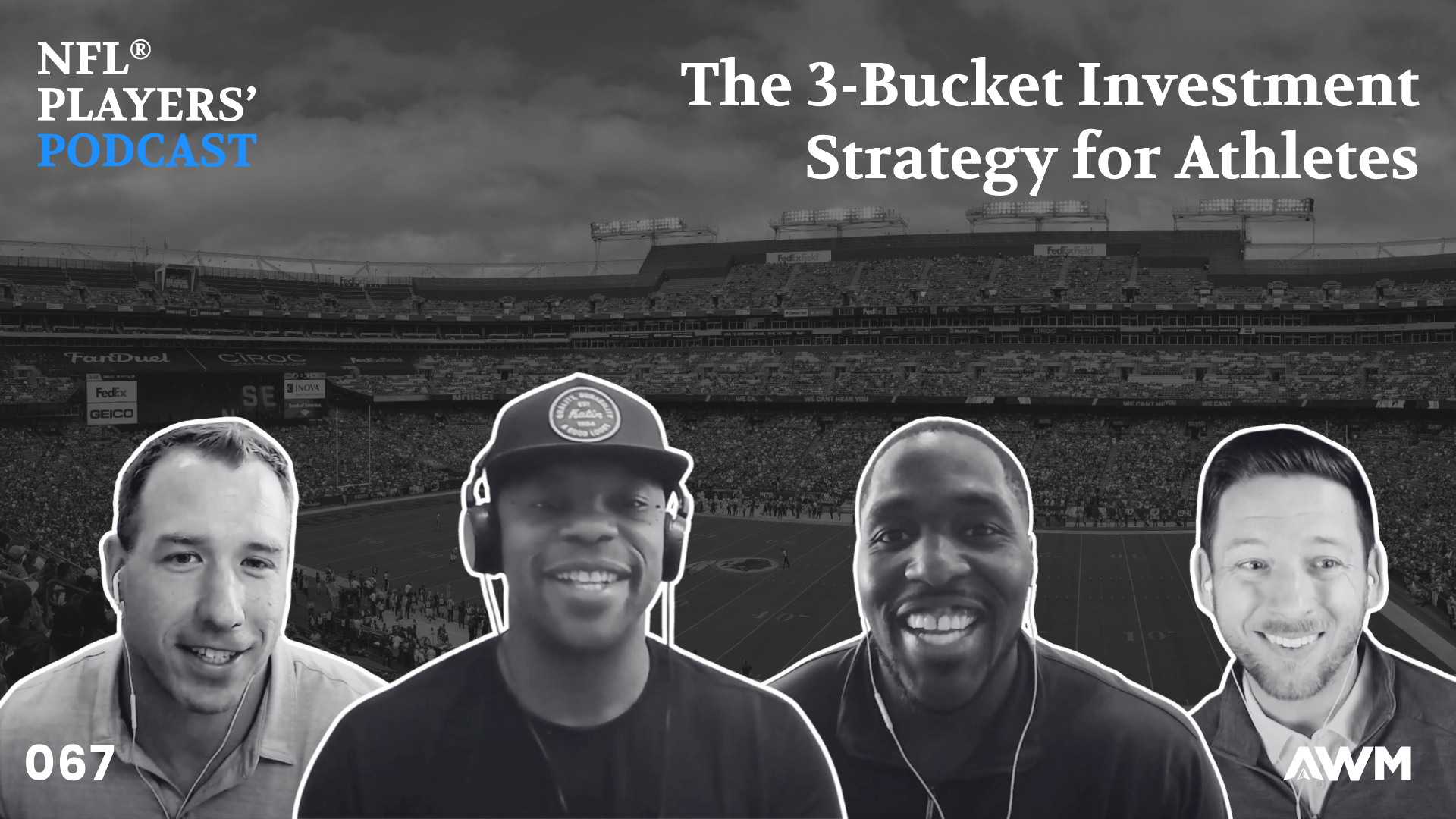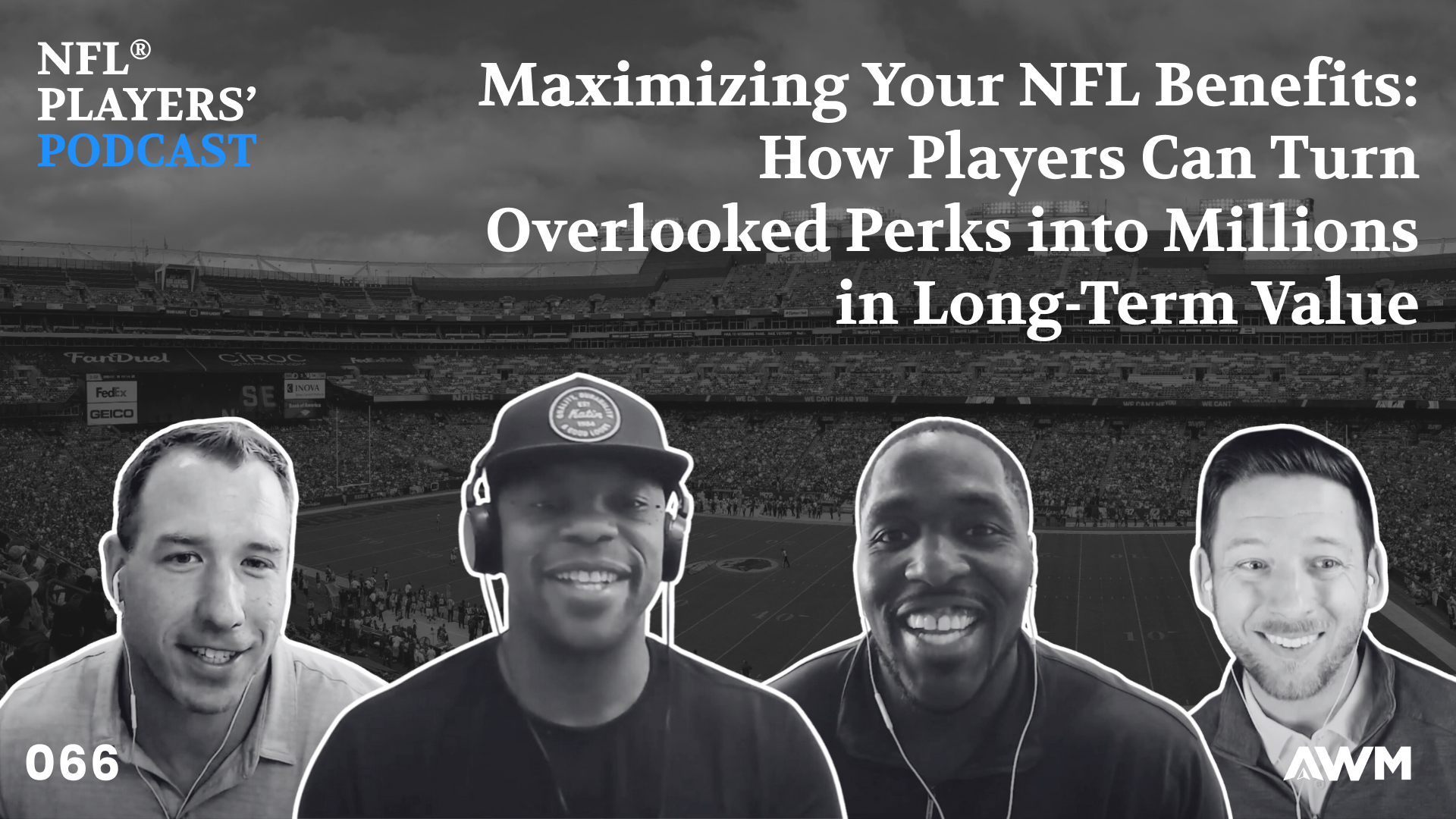Who Is Qualified? How to Build Your Financial Team as an NFL Player

The most important investment you can make is finding the right advisory team. That decision should be based on skill, not personality alone.

There are more than 308,000 financial advisors in the United States, but very few are qualified to meet your needs.
The most important investment you can make is finding the right advisory team. That decision should be based on skill, not personality alone.
Unfortunately, all too often people believe that if they like the person that means they are trustworthy.
“They hire these people not because of expertise but because they’re friends. Well, they’ll fail.” – Magic Johnson
It’s not that likability doesn’t play a role in your decision, it’s just that the stakes are too high to risk your financial success on personality alone.
Finding qualified advisors is particularly challenging because Wall Street is counting on people “buying” on personality. The industry selects, trains, and retains based on sales ability, not expertise. Accordingly, to the untrained and inexperienced eye, it is difficult to distinguish the qualified expert from one who is simply a good salesman.
The biggest risk that you face is trusting the wrong people.
The cost of unqualified advice
· paying more taxes
· accepting lower returns, and
· leaving yourself exposed to higher liability
The problem is few have the education, experience, and time to conduct proper due diligence. This is not a failure of the athlete, rather, Wall Street. In an industry of vulnerable consumers, the industry should be responsible for protecting the consumers.
Imagine if anyone could call themselves a doctor and you had to try and figure out when hiring a doctor, “do you actually know what you're doing?”
The reason we have confidence in the medical industry is that there is a process that distinguishes who can say they are a medical doctor. It takes between 10 to 14 years to become a fully licensed doctor. Four years of undergraduate studies, eight years of medical school, and learning under experienced medical professionals during a residency. In addition, there is a medical ethics board that holds them accountable. Beyond that, medicine is highly specialized. It would be crazy to have an orthopedic surgeon do brain surgery!
The good news is there is a playbook to hiring qualified experts and avoiding the unqualified. This is what we will be covering in detail here.
Before we jump into who we should be hiring, we need to know what we are hiring them to do.
What are you trusting (hiring) them to do?
What do you think about when you hear the term financial advice or financial advisor?
Investments?
That is because most companies and individuals who refer to themselves as financial advisors only provide very limited investment advice.
Real financial advice, is not solely investment advice.
Investments are critically important; however, it is only one component of making wise decisions.
An analogy, that may be helpful is to think about investments as the engine of a car. Incredibly powerful, however, it’s not the actual car. There is a body frame, wheels, windows, a steering wheel, seatbelts, and the list goes on. There are many components that make up a high-performance vehicle. In addition, the vehicle is actually a means to an end. The purpose of the car is to take you from where you are today to the desired destination. That’s why we use Google maps.
Let’s Talk About Taxes
I’m sure that you know that what you get paid is not what hits your pocket. What we are referring to is taxes. Taxes are the number one destroyer of wealth.
Real financial advice begins with how do we make sure you will receive the most amount of money after tax.
As a professional athlete in the highest tax bracket, 40 to 50% of every dollar may be destroyed by taxes. What wealthy people know is that a dollar saved is more valuable than a dollar earned. in this case, It's the equivalent of earning 40 to 50% which is near impossible to do in investing.
Unfortunately, this is where most traditional financial advice completely breaks down. If you were to look at the disclosures on the bottom of the website of big Wall Street names, Merrill Lynch, Morgan Stanley, UBS, Wells Fargo what you would see is the statement, “We do not provide tax advice. All decisions regarding the tax implications of your investments should be made in consultation with your independent tax advisor.”
What is arguably the most important component of financial advice is completely ignored.
The reason is that their ideal client is the mass affluent. only .1% of single people or .7% of married couples are actually in the highest tax bracket. 80% of individuals pay less than 15% in taxes. These companies, do not provide comprehensive financial advice, they sell limited investment products that they try to scale across as many people as possible.
Advice For The Masses is Not For You
NFL 401(k), Retirement Plans & Benefits
Your NFL 401(k), Retirement Plans & Pension are significant assets that also need to be integrated into your wealth plan. Yet, Wall Street and its advisors cannot legally provide advice on these important assets because they are not on their limited investment platform.
The NFL Retirement Plan: Everything You Need to Know (2022)
As a professional athlete, you require integrated financial advice every day across your income, investments, and business decisions.
Success Defined: Maximizing Your Net-Worth
As an athlete, you don’t optimize to become a world-class weightlifter. You lift weights in a specialized way to help you become elite at your specific position on the field. You are a football player, not a weightlifter. The weights are a means to an end.
The same principle applies to money.
Money is a tool to pay for the things that are important to you and to impact the people and causes you care the most about.
Investments, like weights, are a means to the end.
The outcome you want to optimize for is maximizing your Net Worth to pay for what’s important without having to work, forever. This is Financial Freedom.
“Financial advice” is about far more than just managing an investment portfolio, it touches every aspect of your life and career. You have one net worth and one effective tax rate. Every decision will impact your net worth.
To achieve this requires a team of experts across tax, investment, insurance, legal, and business. Yet, most advisors only provide investment advice on a limited amount of your money.
Thankfully, there are companies known as Family Offices that provide the integrated team you need.
What’s the difference between a family office and financial advisors?
A family office is a private wealth management advisory firm for wealthy clients. Family offices bring together an integrated team, so that all aspects of a family’s financial structure and wealth strategy are aligned.
The history of the family office goes back to the industrialists and business titans of the nineteenth and early twentieth century – names like Rockefeller, Carnegie, and Vanderbilt.
These families discovered that hiring their own expert staff to administer their wealth was more effective and cost-efficient than working with multiple big banks, legal offices, and accounting firms.
The early family offices ensured continuity of family businesses, invested in family trusts that grew to sustain multiple generations, and administered philanthropy on a massive scale.
The world’s wealthiest families still operate on this model. People like Bill Gates, Jeff Bezos, and Elon Musk have private family offices to manage and grow their wealth, which includes complex investments, businesses, trusts, charities, and lifestyle holdings.
They hire teams of experts working solely for their families to increase their net worth and establish the continuity required to sustain it across generations.
Because this model is so effective, it has proliferated along with the increasing number of ultra-high-net-worth families around the world.
Advisory firms like ours, called multi-family offices, provide the same service for wealthy clients and families who need it – but who don’t want the complexity and expense of setting up their own single-family office.
Having clarity on what services and expertise you need will help you eliminate unqualified advisors and eliminate unnecessary meetings.
Now that we know what we are hiring a financial team to do, we can focus on who to trust.
How we define trust
Sadly, when you listen to interviews of people who have been victims of fraud or unqualified advice, they are shocked that it happened to them because they “trusted” that person. In the event of fraud, it was a violation of ethics. However, in the event of unqualified advice, you may have a highly ethical advisor, but they did not have the skills or expertise to fulfill their promise. The latter is what we see as most common.
We need a more robust definition of TRUST.
Define Trust
In the book, “The Speed of Trust” by Stephen M.R. Covey he says, “Trust is a function of both character and competence. Character includes your integrity, your motive, your intent with people. Competence includes your capabilities, your skills, your results, your track record. And both are vital.”
You may trust someone's character implicitly, even enough to leave him in charge of your children when you are out of town. But you might not trust that same person in a business situation because he does not have the competence to handle it.
4 Pillars of Trust
- Integrity: That you are honest and congruent, that you have a reputation for being truthful, and that you would not lie.
- Intent: That you are not trying to deceive or protect anyone, that you don't have any hidden motive or agenda.
- Capabilities: That you do, indeed, have expertise, knowledge, skill, and capability in the area in which you are called to testify.
- Results: That you have a good track record, that you have demonstrated your capabilities effectively in other situations in the past, that you produced results, and that there is good reason to believe that you will do so now.
As an example, I trust my dad to watch my children.
- Integrity: I know my dad is honest and truthful.
- Intent: His interest is completely aligned with mine. As their grandfather he wants them to be healthy and well cared for.
- Capabilities: He is both mentally and physically able to meet the demands of watching the kids.
- Results: He has a track record of raising two of his own children who are now law-abiding citizens!
However, I would never trust my dad to play quarterback for the LA Rams.
- Integrity: Yes, he is honest and truthful. This alone would prevent him from lying about his ability to play quarterback in the NFL.
- Intent: He may want to play quarterback, but that conflicts with what the Rams would actually want.
- Capabilities: None
- Results: Proven that he cannot be trusted!
As silly as this example is, it does a great job demonstrating that true trust is not character alone. It must always be a combination of character and competence.
Moving forward, let’s assume that everyone you are interviewing are people of integrity. The main focus should be spent on confirming the financial team has the intent, capabilities and results required for you to hire them.
INTENT
Are you required to do what’s in my best interest?
If there is only one question you ask it must be, “Do you act as a fiduciary?” What does it mean to act as a fiduciary?
An advisor under the fiduciary standard is legally bound to do what’s best for you in every situation.
Now, doesn’t this seem like this would be the only standard there is? Unfortunately, it’s not.
Brokers are regulated by FINRA under what’s known as the “Suitability Standard.” The suitability standard is nothing less than a license to sell investors products that might not serve their best interest.
The Fiduciary Standard requires your advisor to act in your best interests, period. This standard, however, is governed by the Securities and Exchange Commission (SEC), not FINRA, and it only applies to advisors they have jurisdiction over.
Why do Conflicts of Interest Matter?
According to Merriam Webster, a conflict of interest is defined as: a conflict between the private interests and the official responsibilities of a person in a position of trust.
If you are a client at a Wall Street Bank/Brokerage firm, you will be exposed to significant conflicts of interest. These firms are in the business of selling products and producing a profit for shareholders.
If you hire someone who works for an insurance company (Mass Mutual, Prudential, i.e.) or brokerage firm (Morgan Stanley, Merrill Lynch, UBS, RBC, Wells Fargo), they are “registered representatives” and may have an incentive to sell propriety products.
What Athletes Lose When They Choose A Big Wirehouse | NFL Players Podcast
This does not mean an advisor lacks integrity or is ill-willed. It just means that there is a conflict of interest. We can personally attest to this as former Morgan Stanley & Merrill Lynch advisors which were one of the main drivers for us choosing to leave and join an independent firm.
How can I tell if my adviser is a fiduciary or a stockbroker?
- Ask for it in writing, “Are you legally obligated to put my best interests ahead of yours?” “Will you be serving as my fiduciary?”
- Look at the disclosures on the advisor’s website. Brokers who sell products will have disclosures that look something this:
Company XYZ makes available products and services offered by XYZ, a registered broker-dealer or Member FINRA.
- Ask what licenses the advisor has. A “series 7 license” means the advisor is registered as a stockbroker (the series 7 is the broker examination). The series 65 or 66 means she is registered as an investment advisor. Having both the series 7 and 65/66 equates to dual registration, which brings about its own set of problems.
- Ask if they receive additional compensation for selling banking products or investment products created by their company.
If you choose to hire a broker (registered representative) from a Wallstreet company, you are willing accepting that the advice you receive is filled with conflict and may not be in your best interest.
Independent Registered Investment Advisors
Thankfully for you, there’s a whole category of advisory firms – known as registered investment advisors (RIAs) – who have chosen to be bound by the more stringent fiduciary standard.
RIAs are independent, meaning they are not tied to any insurance products or investment products. As fiduciaries, they are held to the highest standard of care – and are required to always act in the best interests of their clients.
You deserve advice in your best interest, hiring an independent family office is the standard you should require.
CAPABILITIES
Are you qualified to work with someone in my situation?
You Need a Team
Another common mistake we see is hiring a single “financial advisor,” often from one of the large investment brokerage firms. What most of these advisors do not disclose is that you are not hiring the brainpower and resources of the firm. You have thousands of advisors working for the same company, but all are independent of each other. Instead of benefiting from the collective expertise of a team, you are receiving advice from one individual.
Your wealth is too complex for one advisor to handle. No one is an expert in all aspects of finance. You would never win a game if all you had on the field was a quarterback. Even if it’s Tom Brady.
Indeed, there’s a limit to what one person can accomplish. But, a team of experts, with access to vast resources, has virtually no limits.
What do the wealthiest families do?
A simple question and I would argue is the most appropriate question to ask if you desire to create wealth.
These families know their wealth is integrated, the advice they need is individualized, and they require conflict-free independent expertise.
The answer – they hire a team – known as a family office.
The role of the family office is to be the true expert architect of a family’s wealth creation. Their job is to limit roadblocks and to apply their expertise to optimize the flow of money for the family. Taxes, investments, family priorities, children, income, cash flow, liability, relationships, legacy, – these are the things that family office advisors care about and constantly refine their craft on.
The integrated team you choose for your family office should have the right designations and experience to professionally manage your family’s wealth. If not, you’re exposing yourself to unnecessary risks.
When choosing advisors, professional designations aren’t the only consideration. However, they are essential to ensure that certain standards of education, experience, and ethical behavior have been met.
These professionals should be on staff with the firm you hire:
- CFP® (Certified Financial Planner) leading the planning team
- CFA (Chartered Financial Analyst) leading the investment team
- CPA (Certified Public Accountant) leading the tax team
- CPWA® (Certified Private Wealth Advisor) for your generational wealth
- Licensed Attorney advising on your legal needs
Risk and Reward - Who can you Trust?
Above all, you want to hire experts who have advised clients with similar circumstances and goals. You’ll increase your chances of a productive family office relationship when your team has highly relevant experience.
RESULTS
Don’t Be a Guinea Pig
If you were having heart surgery, I’m guessing you would not choose the surgeon who has only performed a few surgeries. Why would you accept anything different when it comes to your finances?
Don’t let someone learn on you.
FIVE QUESTIONS TO SET THE STANDARD
With these five simple questions you can eliminate unqualified advisors. It is that simple. If you choose to violate any of these five questions you are settling for less than the best and heed the warning, “Buyer Beware”.
- Is your company an independent Registered Investment Advisor?
- If no, do not pass go.
- Does your team include a CFP®, CPWA®, CFA®, CPA, & Attorney?
- If no, do not pass go.
- Do you provide tax advice?
- If no, do not pass go.
- Can you advise and manage a client’s NFL 401(k), retirement plans, private real estate, venture capital and private equity investments held away from your company?
- If no, do not pass go.
- Do you work with a minimum of 25 professional athletes represented by at least 5 different agencies?
- If no, do not pass go.
More Resources
For more in-depth questions to ask potential advisory companies, download our Comprehensive Advisory Company Questionnaire at the link below.
Download Comprehensive Questionnaire
For a blank email template that you can send to advisory companies prior to agreeing to a meeting. Download our Blank Questionnaire at the link below. Require all answers to be emailed back so you have it in writing. This simple step will eliminate unqualified advisors and companies that are structurally not aligned with your best interests.
Questions? Get in touch
If you have any other questions we can help you answer as you navigate this big decision, please don’t hesitate to reach out to either of us, personally.
Transcript
Share this post
Related articles
Your Family Office

We're here to help you navigate.
Our advisors are ready to serve as your Athlete Family Office.
Your Family Office

We're here to help you navigate.
Our advisors are ready to serve as your Athlete Family Office.










